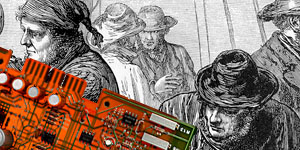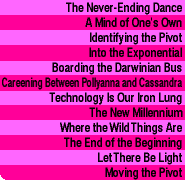


A Mind of One's Own
The brain started as a simple information manipulator to help the body cope with rapid change. A thousand million years ago, when our ancestors were ribbons of cells living in the sea, life was simple. In those days, your earliest senses---taste, smell, touch---directly affected your muscles. A bad taste? Move away. A good taste? Move closer.Then everyone in your ecological niche got the same technology. (You had outcompeted all those who didn't.) So to meet the new competition you enhanced your ability to survive by putting nerve cells in the loop. At first, this loop was simply a faster way to transmit messages within your body---to sense danger and contract distant muscles, detect food and engulf it with other muscles. Soon, however, the nerve cells grew numerous enough to start modeling the world, trying to predict events. Then everyone else in your niche did the same thing. The ones that didn't were eaten by those who did. He who hesitates is lunch.
Of course, the life-forms outside your particular niche didn't necessarily have to change, because they didn't compete with you directly. That's why plants, for instance, didn't develop a nervous system and still need only hormones to control their bodies. On the other hand, all many-celled animals except sponges use both hormones and nerves. Lacking nerves, plants are so slow we don't even think of them as moving at all.
Once your direct competitors also had nerve cells, things quickly became much more complicated. You had to recognize not only food cues but also danger cues. Is the water getting too salty near by? Is it getting too hot? Too cold? Is that nearby life-form trying to make you lunch? Would it make a nutritious snack? Is it a potential mate? As you grew more complex, so too did the questions you needed to answer to survive. Meanwhile, you also had to learn to respond more and more rapidly. Here today, lunch tomorrow.
As things got faster and more complex through the never-ending competition with others and with the universe, you needed to have more and ever more nerve cells between your senses and your muscles---you needed clumps of nerves to manipulate information and decide what to do next. As the complexity increased, these clumps began to use memory---a shorthand snapshot of what happened in the past---as a guide to the future.
So your brain tries to predict the future and guide your body to find good tastes and avoid bad ones. Eventually it could do this many times faster than the genes that created it, just as computers now make decisions many times faster than the people who made them. Munch or be munched.